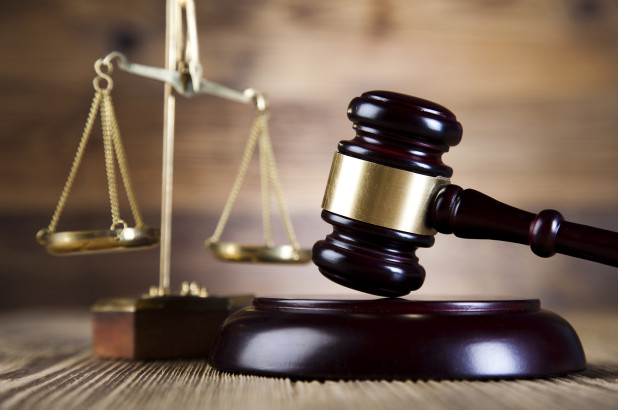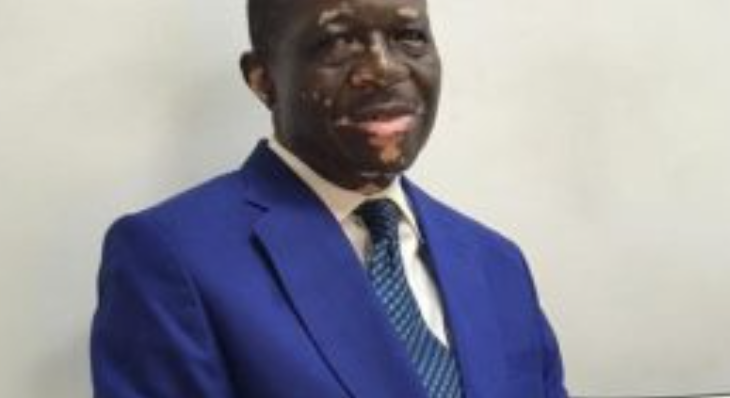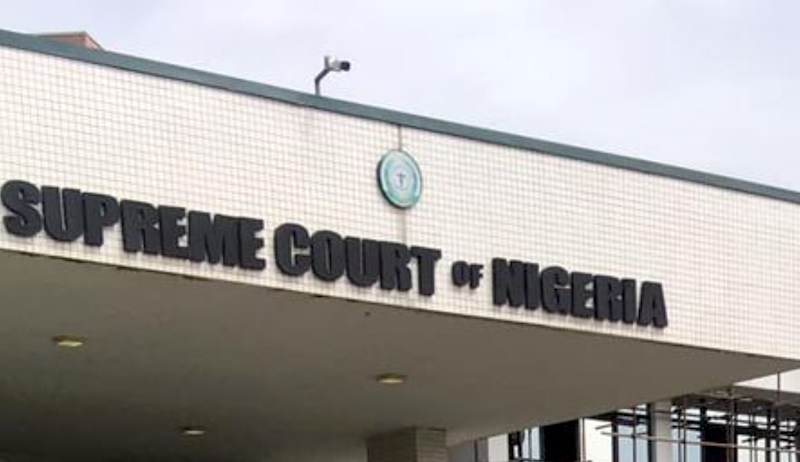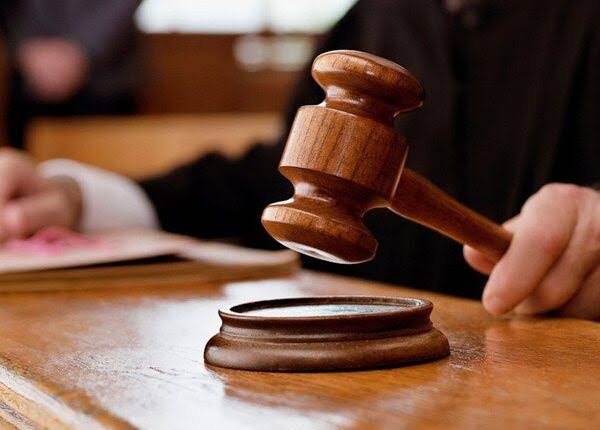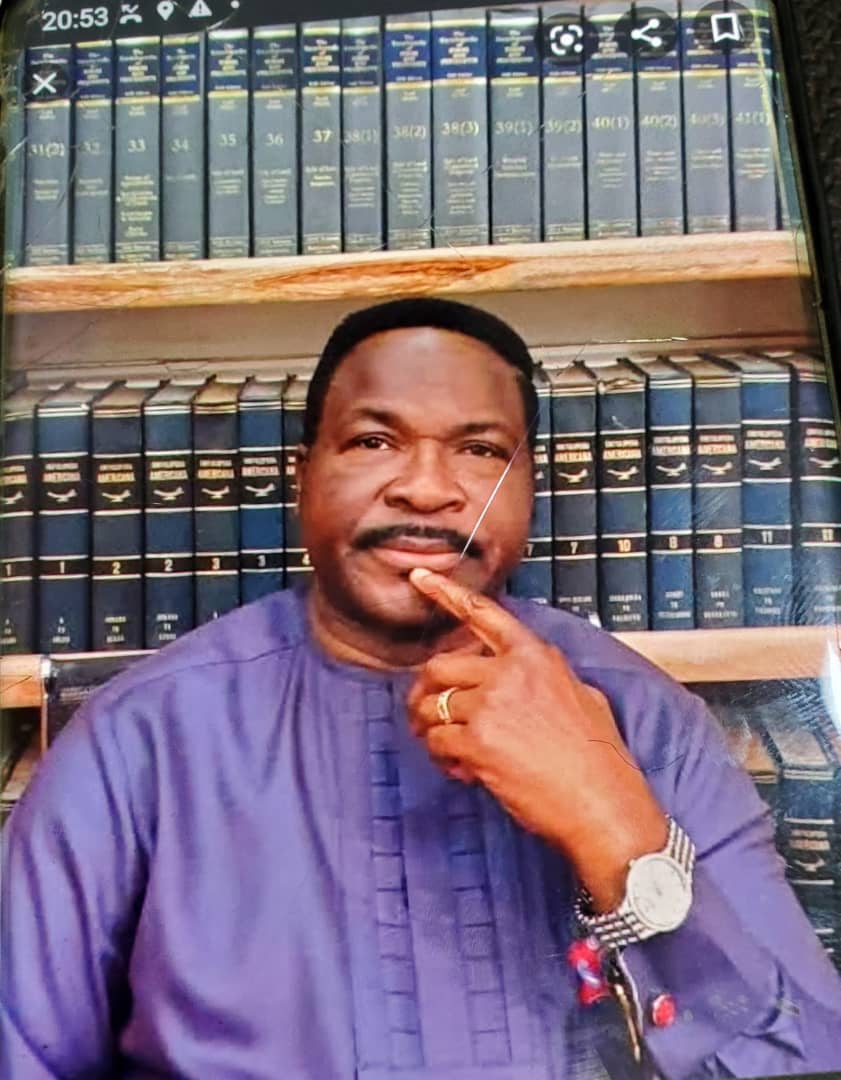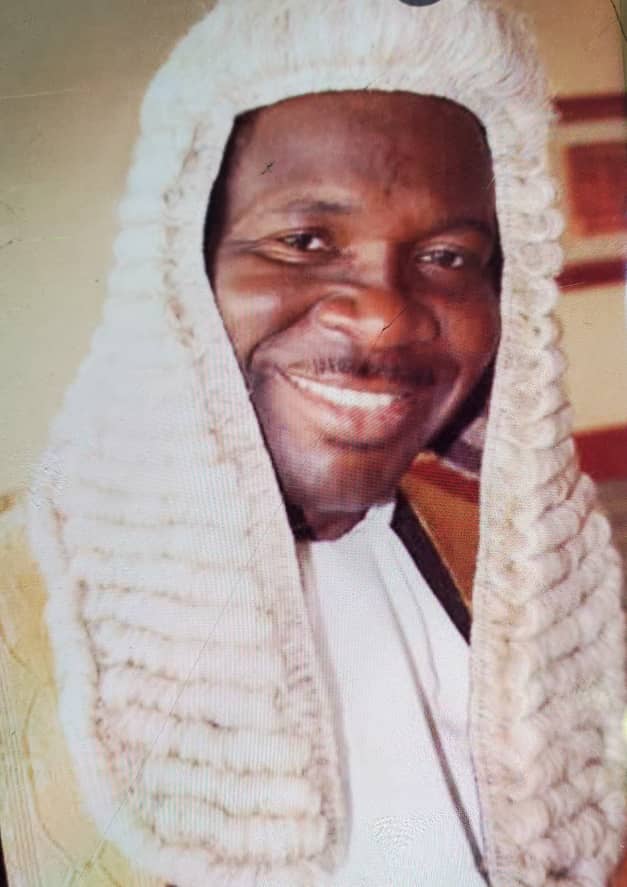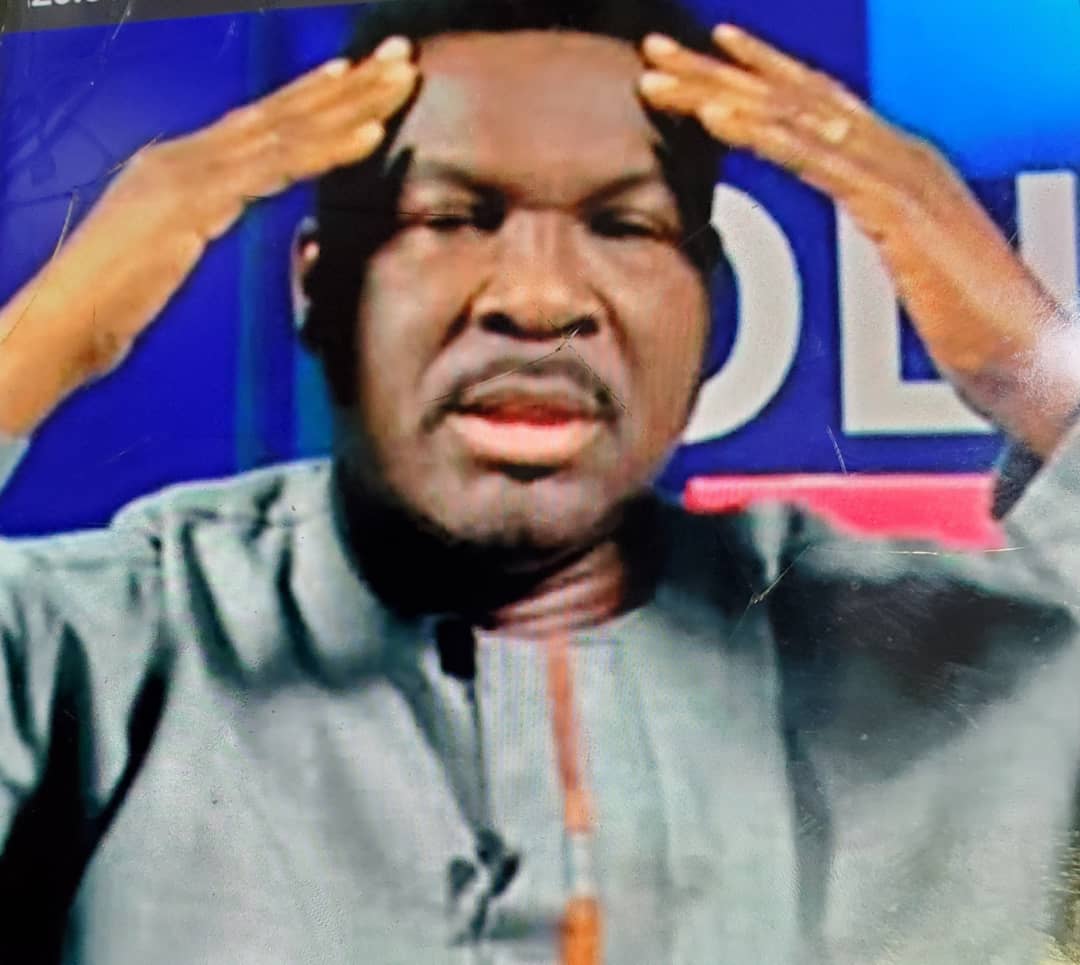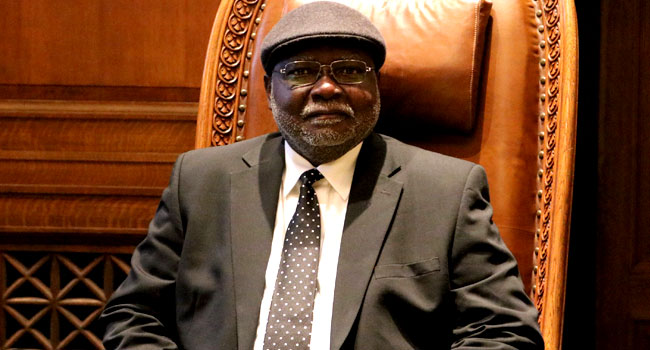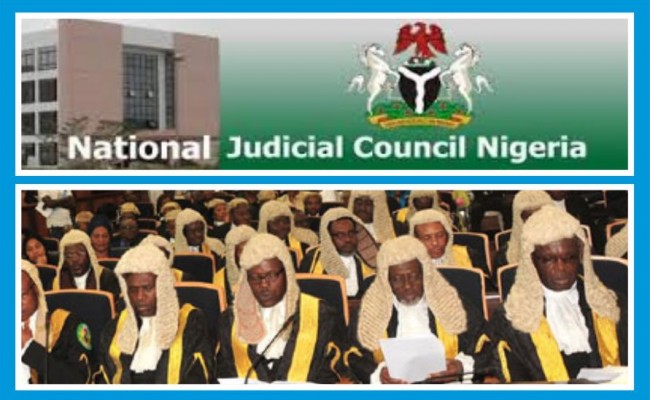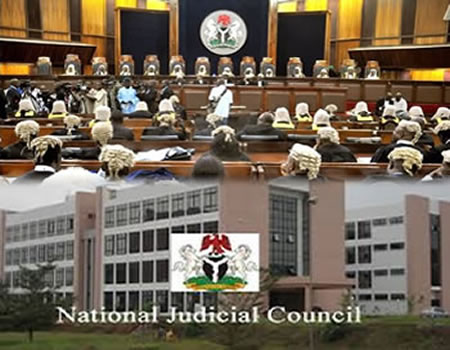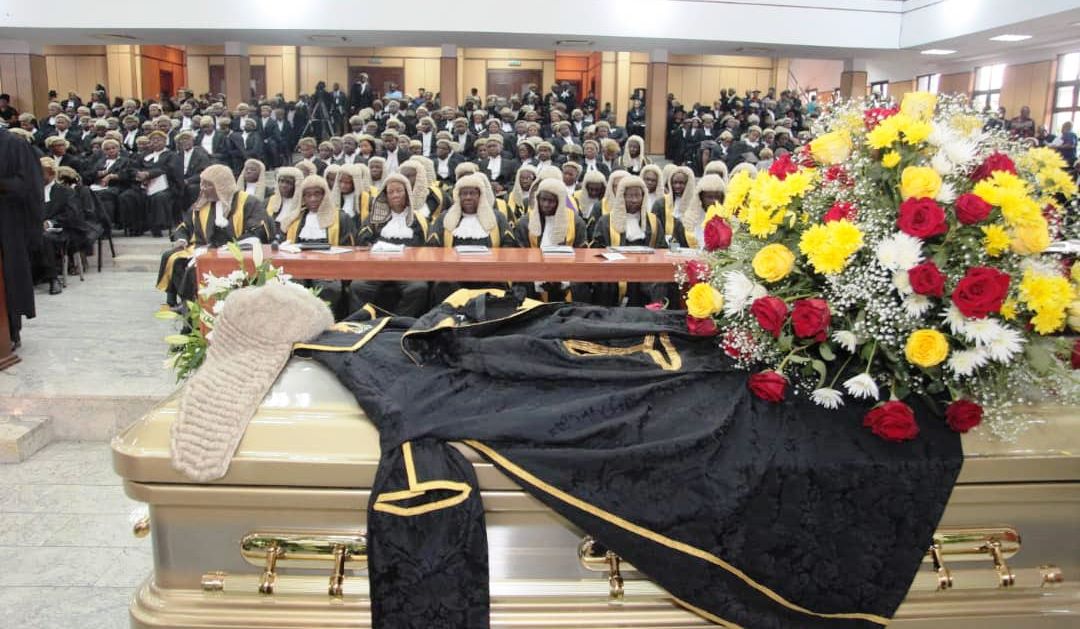For too long,Nigeria and Nigerians have been choked by myriads of constraints and restraints put on them like a harness affixed on a horse to curtail its freedom enabling the rider to control it.
And it is a pity that like a horse ,Nigeria appears to have been ridden by a rough rider instead of an expert jokey.
That is why our country is literally on the verge of falling off the cliff-politically , economically and socially by way of disunity-after being ridden to the precipice by an apparent rough rider that has been on the saddle in the past eight (8)years.
Clearly, as a democrat , president-elect Asiwaju Bola Ahmed Tinubu’s mission upon taking office on 29 May would significantly contrast with the style of governance of the current leadership at the centre.
The assertion above is underscored by the comment that he made at the commissioning of court facilities constructed in Rivers state under the watch of the outgoing governor,Nyesom Wike in the state capital,Port Harcourt.
It may be recalled that during a two (2) day visit by the incoming president Tinubu to the Niger delta state last last Thursday 4th May,he promised that his administration would fight corruption in the judiciary by providing judicial officers with improved remuneration,necessary tools and working environments needed to do their job such as the type of infrastructure that he was invited to commission in Rivers state.
That would be in contrast with carrying out sting operations on members of the judiciary by arresting senior members of the bench in gestapo-like style in odd hours and also taking them into custody in their sleeping wears,all in the bid to intimidate and rob them of their independence from interference by the executive branch.
In my view,a paradigm shift in anti corruption fight that would address the root cause of the malaise would give Nigeria a new lease of life and make our country a truly democratic nation as opposed to the somewhat pseudo-democracy which by all indications and measures is currently in operation in our beloved country.
But President-elect Bola Ahmed Tinubu’s utterance in Port Harcourt on fighting corruption sounded like dejavu encore to me and l guess the same applies to most skeptical Nigerians because that is similar to what the outgoing president Mohammadu Buhari told the long suffering masses in 2015 when he was assuming the role of president and commander- in-chief of the armed forces of Nigeria.
And to the chagrin,utter displeasure and disappointment of hapless Nigerians, corruption in our country according to global corruption watch dogs,particularly Transparency International,TI has worsened between 2015 and today.
Data from Civil Society Legislative Advocacy Centre,CISLAC under the Chairmanship of Mr Musa (Rafsanjani) Auwal, Nigeria’s corruption ranking in the committee of nations in 2022 is 150th position out of 180 countries in the world corruption index.
The only country in west Africa performing below Nigeria or more corrupt than Nigeria according to the graft monitoring organization,Tl is Guinea Bissau.
Our country in a scale of 100, scored 26/100 in 2019, 25/100 in 2020 and 24/100 in 2021.
That signifies continuous decline in Nigeria’s rating which is not good.
And according to media reports referencing Transparency International, Tl chair,Delia Rubio:
“Corruption has made our world a more dangerous place.
“As governments have collectively failed to make progress against it, they fuel the current rise in violence and conflict – and endanger people everywhere.
“The only way out is for states to do the hard work,rooting out corruption at all levels to ensure governments work for all people,not just an elite few.”
After a clear eye look at Tinubu’s promise to combat corruption in the judiciary,it appears feasible that he may be able to slow down the menace during his reign as president because he is planning on tackling it from the angle of closing the loopholes for corruption created by inadequate remuneration for members of the judiciary which is one of the root causes of graft both in the judiciary and indeed the entire governmental system.
So,my confidence in the ability of the president-elect Tinubu to implement the policy of pursuing a paradigm shift in the fight against corruption in the judiciary from the root and not the surface as the outgoing regime seem to have been doing is buoyed by the fact that since he has been a two (2) time governor of lagos state (1999-2007),he must understand what it means to make such a significant pronouncement.
As such his proposition must be a product of critical thinking and not mere brain wave as Nigerians have witnessed in the past eight (8) years.
Incidentally,reforms in the judiciary, particularly with respect to a better welfare package for the members of the judiciary are supposed to already be afoot as evidenced by the approval for increase in the remuneration of Supreme Court justices (N10m and N90m monthly for both the Chief Justice of Nigeria,CJN and President of the Appeal Court and other justices respectively) introduced by the outgoing administration of president Mohammadu Buhari,but it is yet to be implemented.
The reality is that Nigerian judges are paid less than our law makers.
Even as judges in Ghana and South Africa earn higher emoluments than their Nigerian counterparts, yet Nigeria is often touted as the giant of Africa.
But the 40% across board increase in the salary of civil servants including members of the judiciary by the outgoing government at the centre is being envisaged as a moral and productivity booster as it is also geared towards reining in or discouraging corruption not just in the judiciary but the government system as a whole.
Although,one is cognizant of the fact the pending petrol pump price increase following the end of petrol subsidy regime from next month as the current regime exits Aso Rock Villa would wipe out the value of the 40% salary increase just being implemented,for now the increase in salary effected last from month world give the long suffering workers succor before the president-elects takes office and decides what to do about petrol subsidy removal.
In my view, petrol subsidy must end as planned and a 100% increase in salaries for workers across board would be a necessary first step to ameliorate the consequential effect.But that is a subject for another discourse.
Meanwhile, although improvements in the remuneration of judicial officers had already been approved,but it remains unimplemented despite the fact that agitation for pay raise for justices has been ongoing since 2008 which is such a shame that such a critical sector has been neglected in the scheme of things for so long.
That is perhaps what informed Asiwaju Tinubu’s promise in Port Harcourt and justification for his assertion about the proposed reforms aimed at stymying corruption in the judiciary under his watch from 29 day of this month,all things being equal.
So,presumably,the in-coming president’s statement is likely not a frivolous utterance but a tactical component of his grand strategy detailed in his Renewed Hope 2023 manifesto which is an 88 page development template that he leveraged to woo Nigerian electorate to vote for him in the course of the just concluded electioneering campaigns.
At inception of the outgoing administration,the third (3) branch of government (judiciary) had appeared like the last bastion as it had remained in large part untainted.
But after a short period,it wilted owing to the onslaught by the executive arm through undue interference that has blighted it to the extent that most Nigerians no longer see it as infallible and unbiased.
And it is precisely why the judiciary is now on ‘trial’ which is such an irony because it
used to be law breakers that would be on trial by the judiciary.
Arising from the above ,the president-elect is spot-on,on the score of planning to tackle corruption in the judiciary as part of his party’s plans towards renewing hope in our beleaguered nation.
The truth and reality are that it is a pliant judiciary that enables or facilitates the emergence of unscrupulous politicians.
Now,not many people can spot the uncanny link between the judiciary and politicians. But president- elect Tinubu seems to have made that connection hence he seemed to have given a sneak preview of his agenda when he gets sworn into office from 29 May.
The nexus between the judiciary and legislators as well as politicians in general is reflected by the catch phrase currently dominating the political space ‘Go To Court’.
The absurdity was given a new lease of life by the Independent National Electoral Commission,INEC chairman,Prof Mamoud Yakubu when he declined to respond to political party agents complaints about perceived improprieties identified during the collation of the results of the 25 February elections.
Taunting aggrieved co-contestants for political office by daring them to go court is particularly the case in Nigeria where some unscrupulous political actors prefer not to campaign or woo the electorate,but deploy their financial war chests into ‘settling’ members of the bar and bench that help them obtain and maintain crooked mandates via courts as opposed to the electorate exercising their right to choose a president,senators,members of House of Assembly,HoRs,governors and state houses of assembly members.
Since the return of multi party democracy in 1999,following former president Olusegun Obasanjo’s reign up to 2007 during which the rule of law was trampled upon and the principles of democracy were disregarded,it was acknowledged by subsequent decent political actors that election malfeasance had reached an alarming proportion in 2007.
That realization prompted more democracy advocates in leadership to be more determined to reform the system and urgently too.
So,it is the reform that was commenced in 2007 by the justice Lawal Uwais committee established by president Yar’adua of blessed memory (2007-10) and sustained by ex president Goodluck Jonathan’s regime (2010-15) that culminated into the Electoral Act 2022 passed into law under the watch of the outgoing government.
At this juncture,it is worth pointing out that there are striking resemblances between the general elections conducted in Nigeria in 1979,2007 and 2023.
In a manner that appears like dejavu encore to me,the current circumstances thrown up by elections 2023 may compel president-elect Tinubu to elect to replicate what late Umaru Yar’adua did in 2007 when his emergence as president midwifed during OBJ’s watch was alleged to have been tainted as is currently the case with Asiwaju Tinubu’s mandate in 2023, which is some sixteen (16) years after.
And upon being sworn into office Yar’adua vowed to immediately embark on a reform of the process of recruiting political leaders.
Asiwaju Tinubu in 2023 , like Yar’adua in 2007 who pledged to reform the electoral system is already pledging to end corruption in the judiciary through boosting their remuneration and providing a conducive working environment for them.
That implies that there is a parallel between Yar’adua’s action in 2007 that vowed to improve on the electoral process and Tinubu in 2023 committing to eliminating corruption in the judiciary.
Commendably,Yar’adua kept his promise by setting up the justice Lawal Uwais committee that laid the foundation for the electoral reforms that birthed previous reforms that culminated into Electoral Act 2022 currently in operation.
Having made a similar commitment on May 4 in Portharcourt which is about twenty five (25)) days to his inauguration into office as president and commander-in -chief of the armed forces of Nigeria, hopefully, president- in-waiting Asiwaju Bola Ahmed Tinubu would fulfill his promise in the manner that Yar’adua did.
A constitutional crisis similar to the instant one bordering on elections result also had arisen in 1979 when Chief Obafemi Awolowo of UPN disputed the victory awarded Alhaji Shehu Shagari of NPN and the issue of what constitutes 25% of 19 states of the federation became a protracted matter requiring Supreme Court intervention in the manner that 2/3 majority votes in the Federal Capital Territory, FCT is currently a point of contention in election 2023.
Given the anxiety that it generated,it was not expected that our law makers would not have learnt some useful lessons and as such ensured that such type of complexity is avoided forty four (44) years after.
One common denominator between president-elect Tinubu ,former presidents Yar’adua (2007 -2010), Goodluck Jonathan (2010-2015) and Shehu Shagari (1979-2003) is that they all introduced or tried to introduce reforms in the electoral system. They also tackled corruption in more scientific ways than through sheer brute force or naming and shaming methodology adopted by former dictators/ex heads of state turned democrats-generals Olusegun Obasanjo(1999-2007) and Mohammadu Buhari (2015-2023).
Fortuitously,the president-elect Tinubu whose task would be to dig our beloved country out of the deep hole where it has currently sunken, all things bring equal has set the agenda by making one of his priority initiatives the restoration of confidence of Nigerians in the judiciary.
And he would have to do so by sanitizing the judiciary which is the conscience of democracy and society if it is creditable,but can be instrumental to perpetuating bad governance or leadership,if it is corruptible.
So,to birth a new Nigeria,first of all,the judiciary have to be cleaned up as it were.
Right now ,most Nigerians would argue that it is the judicial institution without integrity that is constituting a drag on our country and inhibiting it from becoming the true leader of Africa and a very consequential country in the world.
That is why the judiciary is currently on ‘trial’.
I am of the conviction that if the judiciary that is fundamental to the recruitment of our political leaders in Nigeria is fixed or put on even keel,after its ‘trial’, then our country would be on the path to a rebirth as she would be positioned to be the true leader of Africa and also one of the leaders of the world.
The critical role of Nigeria in the world order was recently acknowledged by the leader of the free world,USA President Joe Biden in his goodwill message to our country in the run up to the just concluded general elections.
But to truly earn the global recognition and respect that President Biden and many other world leaders have identified and exhorted us to live up to,sanitizing the judiciary should be the task that must be accomplished by president-elect Tinubu after he gets sworn into office on 29 May,as substantive president of Nigeria,all things being equal.
If that becomes one of Mr Tinubu’s main goal,as stated earlier,history may be repeating itself because reformation of the electoral system is exactly what Umaru Yar’adua of blessed memory embarked upon after he was swept into office in a gale of disputed election result as is the case in 2023 whereby the president-elect Tinubu is about to be propelled into office as President and Commander- In-Chief of the armed forces of Nigeria in similar circumstances.
Without cleaning up the proverbial Augean stable which the judiciary seems to have become,whatever the incoming government does would be tantamount to building a house on a weak foundation.
And the justification for the assertion above is derived from the reality that the aforementioned institution has been too malleable and susceptible to manipulation by political actors,hence our country has remained anchored on a shifty framework that has been hindering her from attaining her full potentials as the true leader of Africa in terms of being built on sound democratic principles and anchored on solid economic foundation.
Universally,great countries (apart from communist China,Russia and North Korea and monarchies governed with religious dogma) emerge from having a robust judicial system with the rule of law embedded in its DNA. That is what would ensure the emergence of citizens that are driven by equity and justice that would ultimately produce leaders recruited through transparent,fair and free electioneering processes for egalitarian society.
But the image of the judiciary has been worsted by a series of recent judgements that have befuddled Nigerians hence the third (3rd) branch of government has been in the eyes of the storm and on ‘trial’as it were.
Readers would agree that it is an understatement to say that the recent judgements appear preposterous to ordinary Nigerians as they have been unable to discern the rationale for the decisions without the judiciary giving explanations on how it arrived at the very complicated and confusing decisions.
In order words,Nigerians are distressed and frustrated because the aforementioned agency governing a critical aspect of their existence is in their view not living up to their expectations as their rather opaque decisions are not being explained to them in order to know why and how they made their seemingly odd and perplexing judgements.
Hopefully,the final decision of the current election petition tribunals across the country in the process of resolving the disputes arising from the 25 February presidential and legislators elections and 18 March gubernatorial and state houses of assembly races would be very transparent.
Based on the reality of lack of confidence besetting the judiciary in the court of public opinion,l urge our lordships in the temple of justice, particularly the tribunals hearing the presidential petitions to intentionally enlighten Nigerian masses on the steps taken and why in arriving at their decision.
My point is that more robust communication between the judiciary and the electorate is critical at this point in time.
As we all agree,extraordinary situations demand extraordinary solutions.
Therefore,the approach of painstakingly explaining the reasoning behind their decision which would perhaps not ordinarily be the normal drill is required when they arrive at the decisions on the matters in which they are currently adjudicating in order to carry all Nigerians along and reduce the possibilities of misunderstanding of the intents and purposes of our learned tribunal panelists that could result in further strain in the relationship between the judiciary and the people.
As the conventional wisdom goes,justice is not only supposed to be done,it also needs to be seen to have been done.
Without a doubt ,with the tribunal justices going out of their way to carry Nigerians along by educating the masses on the principles applied in arriving at their judgement,the purpose of erasing any and every reasonable doubts,would be served.
To most Nigerians,it was rather demoralizing and demotivating that the matter of who would become the political leaders of Nigeria is now at the behest of leaders in the temple of justice,not the masses as should have been the case.
The resentment towards the judiciary by some Nigerians conveyed by the media which is the voice of the people elicited an incendiary media statement released recently by the spokesman of the Supreme Court ,Dr Festus Akande.
He berated members of the fourth estate of the realm government (media) for daring to put judicial officers and the judiciary under trial as it were.
In his view: “No Court in any clime is a Father Christmas; so,no one can get what he or she didn’t ask for.
“Similarly, all matters are thoroughly analysed and considered based on their merits and not the faces that appear in courts or sentiments that attempt to becloud the sense of reasoning.
“So,for anyone in his or her right frame of mind to insinuate that the justices have been bought over by some unknown and unseen persons is,to say the least, a bizarre expression of ignorance,which definitely has no place in law. “We are not surprised with the surge of these well-orchestrated verbal assaults on judicial officers across the country at this period of elections”.
As the apex court spokesman concluded , ‘it is a thing we are used to and are ever ready to absorb whatever comes our way; but there should be some level of decorum and dignity in what we say and do.
“Politics should not be played without recourse to good conscience and acceptable moral conduct, as everything is evolving globally”.
I would like to reiterate that a new Nigeria is possible if the judiciary after its current ‘trial’ ,becomes more open and welcoming to criticism by electing to drain the ‘swamp’ in which it is currently mired and a situation that going by pronouncements by its leaders in numerous workshops and seminars,it acknowledges and which is also recognized by president-elect Tinubu’s pledge to scrub the judicial institution clean of corruption via improved remuneration and other perks that would make malfeasance unattractive to members of the bench.
Although,l do not have empirical evidence as to how Nigerians perceive the judiciary, it may not be far from the abysmal level of skepticism with which the masses currently view the elections umpire, Independent National Electoral Commission,INEC.
And the likely low esteem of the judiciary in the eyes of Nigerian public stems from the recent and not too recent verdicts from our courts in landmark cases ranging from recent highly controversial judgements concerning governors and lawmakers who most Nigerians in frustration assume are induced either with money or coercion of power by state actors.
And all the perceived malfeasance has been swirling around in the mass media and they are subject of gossips in drinking bars,hair dressing saloons and motor parks.
It may be recalled that Mr Rotimi Amaechi who did not participate in campaigns and governorship election processes in Rivers state in 2007 ,which was according to INEC won by Mr Celestine Omehia,but whose victory got upturned by INEC in a manner that has left a lot of Nigerians still scratching their heads and even left bitter taste in the mouths of others.
A similar judgement to the one in Rivers state reoccurred in lmo state in 2019 when judgement was given in favor of incumbent governor,Mr Hope Uzodinma who was adjudged to have come in the 4th position in the INEC declared result that got upturned by the courts when it stripped Mr Emeka lhiedioha of the title and position after he had been declared winner by the electoral body and sworn into office as the state governor.
There are more similarly stunning decisions emanating from the courts in recent times. These are in respect of the emergence of senate president,Dr Ahmed Lawan as candidate for the senate even in the current election circle when he was also a contestant for the presidency at the same time and to some extent senator-elect Mr Godswill Akpabio who is currently the front runner to become senate president in the 10th assembly beginning next month,June.
These two (2) very important personalities in the eyes of the ordinary Nigerians bought tickets and contested for the presidency in the same election season.
In their simple logical thinking,the pair could not have also legally contested for senate seats,which is basically contrary to the provisions of electoral act 2022.
Perhaps explanations about what informed the decision by the Supreme Court decisions to allow them be candidates for two elective posts in the same electing circle from Dr Akande could have cleared the fog.
In the absence of the much needed clarity,those judgements riled up Nigerians to the extent that the reputation and credibility of the judiciary has further dipped hence the third (3rd) branch of government appear to be on trial in the court of public opinion.
And it is all of the referenced presumed malfeasance that have been swirling around all over the mass media,thus further sullying the image of the judiciary.
Although,l have a gut feeling that the courts may not be really culpable of malfeasance in giving some judgements that have turned out to be irksome to some Nigerians as highlighted above,the cynicism against the judiciary,as stated earlier may have its origin in the fact that it is not explaining its decisions to the Nigerian public in ways that they can understand the logic or jurisprudence behind the verdicts that they have been giving lately and which are obviously strange to most of us.
So,the power of communications that oils the wheels of relationships between partners and even husband and wife may be the bane of the judiciary and the reason it is currently despised.
As to be expected, in the absence of a robust communication strategy,the image or reputation of those who preside in the temple of justice have been dragged to the gutter level,and therefore abysmally sunken.
Perhaps members of the judiciary have to read a poem written by the celebrated poet ,Prof Niyi Osundare about alleged criminal judges titled: My Lord, Tell Me Where To Keep Your Bribe” to come to terms with why the judiciary is on trial.
If they are yet to read it,l have shared a snippet as presented below:
“Do I drop it in your venerable chambers
Or carry the heavy booty to your immaculate mansion.
Shall I bury it in the capacious water tank
In your well laundered backyard.
Or will it breathe better in the septic tank.
Since money can deodorize the smelliest crime.
“Shall I haul it up the attic.
Between the ceiling and your lofty roof.
Or shall I conjure the walls to open up
And swallow this sudden bounty from your honest labour.
Shall I give a billion to each of your paramours….”.
The poem which l have tagged ‘Poetic Justice’ goes on and on laying bare the foibles of alleged corrupt judges that are supposed to be incorruptible.
The bottomline is that if a new leaf is turned for good in the judiciary after going through its trial in the court of public opinion by stymying corruption amongst its members as president-elect Tinubu is proposing ,a new Nigeria is possible.
Now,let me make it clear at this juncture that the excerpt reproduced above is not meant to discredit or ridicule the judiciary.
But it is aimed at calling the attention of the relevant department or officials to the sordid reputation that the institution has acquired,so that they can quickly find a way or ways to redeem the sunken image.
The truth is that our country needs transformation and it must start from a critical branch of government such as the judiciary which for the sake of maintaining its independence must transform itself by itself not by the executive arm or the judiciary.
In fact ,it is a compromised electoral and judicial system that would midwife the birth of executive and legislative actors that may pervert governance.
That is why it is imperative that change starts from the baseline or maternity wards or delivery rooms for political actors which is election process that can only be midwifed by a robust and conscientious judiciary that is alive to its responsibilities by keeping in check potential excesses of the electoral umpire which is an agency of the executive branch.
As media columnists/public policy analysts,we bear the burden of writing both scathing and endearing comments on both good and bad events or occurrences uplifting or afflicting our compatriots in the society.
In the same manner,judges in the temple of justice give judgements that may be good and bad to the plaintiffs and defendants respectively,no matter whose ox is gored.
But unlike media men and women,our lordships only face the wrath of the masses when they give judgements that appear to be opaque to them.
And whenever their independence is threatened by the executive or legislative branches,the members of the fourth realm mobilize the masses to align with the judiciary to fend off its invaders.
That was witnessed recently when judges got treated shabbily by being antagonized by the outgoing administration from around 2019.
The media was also vocal in advocating for improved pay for Supreme Court justices when the issue came up via a leaked petition to the presidency and the outgoing authorities have approved but unfortunately failed to implement the raise in salary and other perks.
But conversely ,the fourth realm of the estate which is the media is often a victim of the executive arm that chases its members down with state instruments of coercion,particularly by state governors who have caused a good number of journalists to be incarcerated or have their liberty withdrawn as it were for daring to pry into their affairs, even though they are public officers and accountable to the people.
Similarly,the legislative branch is also sometimes hostile to the media as evidenced by the fact that it passes laws that are anti media.
Take for instance the passing of the FoI act that was like passing the Camels head through a needles eye.
Even then the act is hardly respected by all three arms of government that treat the media like a plague rather than ally in nation building that it truly is.
So also are the anti-social media bills introduced during the 8th assembly by senators Ghali Na’aba,and an action that was repeated by senator Sani Musa in the 9th assembly,and both of which are believed by the media to have been meant to gag the press.
But president Buhari distanced himself from the repressive laws following public outrage.
On its part,the judiciary also often threaten members of the media with sanction as reflected by Dr Akande’s earlier referenced pungent press release.
That is in-spite of the fact that the media is structured to be partners in nation building with all three branches of government,particularly the judiciary with which it should serve as society conscience.
Worse of all,members of the public whose ox are gored also vent their spleen on members of the fourth realm of the estate who end up bearing the brunt of society in the course of trying to be watch dog on the other branches of government to curb their potential excesses.
The unfortunate assassination via parcel bomb of ace journalist and Newswatch magazine co-founder,Mr Dele Giwa on October 19,1986 is a case in point.
In the light of the above,it is unsurprising that one is currently facing threats of cyber attacks from radicals who are trolling me and threatening to hack into one’s phone to obtain contents which they intend to twist and present to the public in manners that one would be embarrassed.
But,l am unperturbed and unfazed by such nefarious antics which would fall flat and definitely hunt and hurt their backers or those who they are backing when discerning members of the public see through the vile motives of the cyber bullies as sheer blackmail.
As the saying goes,uneasy lies the head that wears the crown. That is an aphorism that encourages one from demurring from taking the responsibility of speaking truth to authorities.
It is rather ironic that it is the seemingly innocuous shortcomings in the reformed electoral act 2022 that have now become the tipping point for the derailment of election 2023 process that was on track to becoming one of the best.
And it is even more so because it is the granular details of the law which are supposed to have been clearly addressed in the course of reforming the former electoral law into Electoral Act 2022,but was left loose that is currently one of the thorny issues besetting election 2023.
And owing to the failings of both the executive (lNEC organized elections in contention) and the legislative branches(drafters of the electoral act 2022 that failed to tie up loose ends), the judiciary is being left to literally clean up the mess, since the burden of untangling the legal complexities with a view to restoring peace and stability in the country has been thrust on it.
The current elections difficulties echoe the constitutional dilemma that necessitated the introduction of the infamous Doctrine Of Necessity by NASS following the sudden death of president Umaru Yar’Adua in 2010 without handing over to then vice president Goodluck Jonathan and a constitutional lacuna arose.
In deed,it is heart rendering that having suffered a similar constitutional crisis bordering on elections result in 1979 when Chief Obafemi Awolowo of UPN disputed the victory awarded Alhaji Shehu Shagari of NPN and the issue of what constitutes 25% of 19 states of the federation became a protracted matter requiring Supreme Court intervention,it was not expected that our law makers would not have learnt some useful lessons and as such ensured that such type of complexity is avoided. But forty four (44) years after, we are faced with the dilemma of debating if winning 2/3 majority of votes in the FCT is a precondition to be declared the winner of a presidential contest.
In the light of the above,a new Nigeria is possible if president-elect Asiwaju Bola Tinubu upon being sworn into office as president from 29 May,would immediately commence working towards forging new policy directions that would prevent the judiciary from being corruption prone by implementing the salary raise approved by the outgoing administration which it has so far failed to actualize .
The request by the PDP that the hearing be broadcast live is one way of carrying the electorate along as it may help the judiciary rescue itself from the black book of Nigerians. Without a scintilla of doubt,it would facilitate a buy-in by the masses if they see the decision of the tribunal as transparent,free and fair.
In fact it would give the masses the kind of respite and confidence that the transmission of elections results from BVAS and IReV by INEC could have inspired amongst Nigerians if the electoral umpire did not renege on its lofty promise.
The open broadcast of the proceedings on television and radio including even exploring a streaming option is necessary as it would amplify transparency in the administration of justice as opposed to the opaqueness exhibited by INEC which has tainted the outcome necessitating the intervention of the judiciary.
The boast by presumed winners and INEC Chairman ,Prof Yakubu gives the impression that the declared victors may have special arrangements in the courts which they intend to leverage to secure victory. That may or may not be the case , but that is what is being passed across.
To dispel the unedifying beliefs against the judiciary and evince the confidence of Nigerians in the electoral system after INEC Chairman frittered it away by not keeping to the promise to Nigerians that he would make the election process open and transparent by putting all the results from Bi-Mordal Accreditation and Verification System,BVAS on Independent Results Viewing Portal IReV potential defendants,the call by Wazirin Atiku Abubakar,former vice president and PDP presidential candidate for the transmission of the proceedings in the tribunal via television,radio and streaming may be a cure to the self inflicted and own goal committed by INEC at the end of an otherwise well conducted 25 February presidential and National Assembly elections exercise.
Robbing Nigerians of that right to know what is going on during elections in real time via electronic transmission is what constitutes the bulk of the reasons that Nigerians resent the INEC.
And it may be for similar reasons that the judiciary may be despised if the masses believe that their role as electors has been usurped by the courts that also denies them the opportunity of following events pertaining to resolving the dispute by the aspirants on real time basis via open broadcast of activities from the tribunal.
Although it is not the making of the judiciary that they are being compelled to intervene,as the Supreme Court spokesperson,Dr Akande veritably pointed out in his media Intervention,it is imperative that the judiciary makes its interactions with the public more dynamic and robust.
Otherwise,the judiciary risks being regarded and identified by the electorate as incubus/succubus which is a characterization that they have already made of INEC and the Central Bank of Nigeria,CBN which are the two (2) agencies of the executive branch of government whose combined policies literally raped Nigerians particularly in the months leading up to elections 2023 and afterwards.That much was captured in my article titled: “Elections 2023 And The Masses As Victims Of Incubus/Succubus Government “ published on Tuesday,18 April in my column and widely shared on other traditional and social media platforms.
Arising from the above,my frank and candid advice to the judiciary is that it should take the request for live transmission via television, radio and streaming of the activities in the tribunals very seriously as it may be the game changer for the election 2023 that is looking like a cliff hanger situation .
As we all know it has a precedence in the Justice Chukwudifu Oputa commission of enquiry created by president Olusegun Obasanjo in 1999 to investigate human rights violations between 1984 and 1999 that was televised for public viewing of the process and which conferred credibility on the outcome of the exercise.
After all said and done,in my reckoning,the judiciary can make a new Nigeria happen by truly acting with the equanimity of lady justice,the iconic symbol of the judiciary that is blind to prejudices and biases.
As the popular maxim goes: the ball is in the court of the judicial.
Magnus onyibe,an entrepreneur, public policy analyst ,author,democracy advocate,development strategist,alumnus of Fletcher School of Law and Diplomacy,Tufts University, Massachusetts,USA and a former commissioner in Delta state government, sent this piece from lagos.
To continue with this conversation, please visit www.magnum.ng

